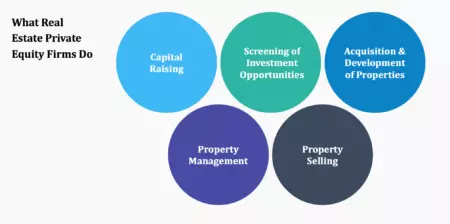
Real estate private equity (REPE) firms play a vital role in the real estate industry by raising capital from private investors and using that capital to make investments in real estate. While there is no standard structure for these firms, they generally engage in five key activities: capital raising, screening investment opportunities, acquiring or developing properties, managing properties, and selling properties.
Capital is the lifeblood of any investment firm, and for real estate private equity firms, the capital comes from limited partners (LPs). LPs typically include public pension funds, private pension funds, endowments, insurance companies, fund of funds, and high-net-worth individuals.

Here is a list of the top real estate private equity firms in 2023, ranked by their five-year fundraising total:
- Blackstone - $48,702 million
- Brookfield Asset Management - $29,924 million
- Starwood Capital Group - $21,777 million
- ESR - $16,603 million
- GLP - $15,510 million
- The Carlyle Group - $14,857 million
- BentallGreenOak - $14,760 million
- AEW - $13,496 million
- Cerberus Capital Management - $13,076 million
- Ares Management - $12,971 million
These firms are known for their expertise, experience, and successful track records in the real estate private equity space.
Real Estate Private Equity Investment Strategies
REPE firms often specialize in specific investment strategies based on certain characteristics related to their investments. These strategies include core, core-plus, value-add, and opportunistic.
-
Core investments: These are low-risk investments in newer properties in excellent locations with high occupancy and creditworthy tenants.
-
Core-plus investments: These investments are similar to core, but may have some minor leasing upside or require small capital improvements.
-
Value-add investments: These investments involve higher risk and can include properties that need significant capital improvements, have significant leasing upside, or are located in tertiary areas.
-
Opportunistic investments: These are the most high-risk investments that may involve new development or re-development projects.
Real Estate Private Equity Jobs
Real estate private equity deals require a team of professionals to execute. Some of the key roles and job types in the industry include real estate acquisitions, asset management, capital raising and investor relations, accounting, portfolio management, and legal support.
The real estate acquisitions role involves sourcing and executing deals, conducting market research, building financial models, analyzing deals, and writing investment memorandums.
Asset management professionals are responsible for implementing the business plan for acquired properties, managing the properties, and ultimately selling them.
Capital raising and investor relations professionals raise money for the firm, manage communications with investors, and provide ongoing reporting on fund performance.
Accounting, portfolio management, and legal teams provide necessary support in their respective areas.
Career Path in Real Estate Private Equity
The career path in real estate private equity is similar to that of traditional private equity. The hierarchy typically includes positions such as principal/managing director, senior vice president/director, vice president, and associate/senior associate.
Entry points into the industry can vary, with some candidates coming from investment banking, real estate asset management or brokerage, or other related fields. The top firms, such as Blackstone, Brookfield, Carlyle, and Oaktree, have a standardized path of progression and often hire from investment banks.
Compensation in the industry is typically heavily weighted towards bonuses, and as professionals progress in their careers, they may also receive a share of the profits through carried interest.
Real Estate Private Equity Interview
Real estate private equity interviews typically involve multiple rounds of interviews, including informational interviews, technical interviews, and superday interviews. The interviews focus on assessing a candidate's technical capabilities, real estate knowledge, and fit with the firm.
Candidates may also be asked to complete a modeling test and/or a case study to demonstrate their skills and ability to analyze real estate investments.
Some common interview questions include:
- Why are you interested in real estate?
- What are the three ways of valuing real estate assets?
- Compare the cap rates and risk profiles for each of the main property types.
- Walk through a basic cash flow proforma for a real estate asset.
- Describe the main real estate investment strategies.
- If you paid $100M for a building with 75% leverage, what does it need to sell for to double your equity?
- If you had two identical buildings, how would you determine which one is more valuable?
- What is the IRR if you purchase a property for $1M at a 7.5% cap rate and exit after 3 years at the same cap rate with 0% NOI growth?
- What is the cash-on-cash yield if you purchase a property for $1M at a 5.0% cap rate with 60% leverage and a 5.0% fixed cost of debt?
- Do you have any questions for me?
Preparing for these questions and having a strong understanding of real estate finance and investment concepts will greatly increase your chances of success in the interview process.
Conclusion
Real estate private equity plays a significant role in the real estate industry, raising capital from private investors and making investments in real estate. The industry offers various career opportunities and requires professionals with expertise in acquisitions, asset management, capital raising, accounting, and portfolio management.
Understanding the different investment strategies, valuation methods, and financial modeling is crucial for success in the industry. By preparing for interviews and demonstrating a genuine interest in real estate, you can position yourself for a successful career in real estate private equity.











